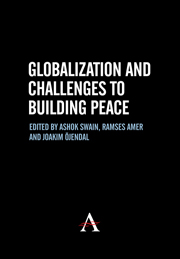Book contents
- Frontmatter
- Contents
- Acknowledgements
- List of Contributors
- 1 Building Peace in the Era of Three Waves
- 2 The Problem of Peace: Understanding the ‘Liberal Peace’
- 3 Pre-emptive Self-defence New Legal Principle or Political Action?
- 4 Beyond Criminal Justice: Promoting the Rule of Law in Post-Conflict Societies
- 5 Peace by Pact: Data on the Implementation of Peace Agreements
- 6 Refugee Repatriation as a Necessary Condition for Peace
- 7 Catapulting Conflicts or Propelling Peace: Diasporas and Civil Wars
- 8 UN Peace Operations as Norm Entrepreneurs: The Challenge of Achieving Communicative Action on Human Rights
- 9 To Practice What They Preach: International Transitional Administrations and the Paradox of Norm Promotion
- 10 Re-examining the Roots of War in West Africa in a Globalizing World
- 11 The African Union (AU) and Its Commitment to Non-Indifference: Can the AU be an Actor for the Promotion of Human Security?
- 12 Hamas Between Sharia Rule and Demo-Islam
- 13 Environmental Scarcity and Intrastate Conflicts: The Case of Nepal
- 14 Narcotics: The New Security Threat for China
- References
- Bibliography
9 - To Practice What They Preach: International Transitional Administrations and the Paradox of Norm Promotion
Published online by Cambridge University Press: 05 March 2012
- Frontmatter
- Contents
- Acknowledgements
- List of Contributors
- 1 Building Peace in the Era of Three Waves
- 2 The Problem of Peace: Understanding the ‘Liberal Peace’
- 3 Pre-emptive Self-defence New Legal Principle or Political Action?
- 4 Beyond Criminal Justice: Promoting the Rule of Law in Post-Conflict Societies
- 5 Peace by Pact: Data on the Implementation of Peace Agreements
- 6 Refugee Repatriation as a Necessary Condition for Peace
- 7 Catapulting Conflicts or Propelling Peace: Diasporas and Civil Wars
- 8 UN Peace Operations as Norm Entrepreneurs: The Challenge of Achieving Communicative Action on Human Rights
- 9 To Practice What They Preach: International Transitional Administrations and the Paradox of Norm Promotion
- 10 Re-examining the Roots of War in West Africa in a Globalizing World
- 11 The African Union (AU) and Its Commitment to Non-Indifference: Can the AU be an Actor for the Promotion of Human Security?
- 12 Hamas Between Sharia Rule and Demo-Islam
- 13 Environmental Scarcity and Intrastate Conflicts: The Case of Nepal
- 14 Narcotics: The New Security Threat for China
- References
- Bibliography
Summary
Introduction
Since mid-1990s the United Nations and other multilateral organizations have through the establishment of international transitional administrations assumed responsibility for governance of war-torn territories. United Nations Interim Administration Mission in Kosovo (UNMIK) is one of the bold experiments in internationally supported post-conflict state reconstruction, democratization and peacebuilding. International transitional administrations, such as UNMIK can be regarded as unparalleled opportunities to exert a normative influence and mould the state in reconstruction into a peaceful, liberal democracy. When the United Nations itself assumes a governing role, there is a temptation to demand the highest standards of democracy, human and minority rights, the rule of law etc. However, UNMIK was established through democratically deficient international processes and it is obviously not a representative democracy and should therefore not be held to the standards of a liberal democratic state. Yet, the mission is mandated to promote democracy and build democratic institutions of governance in Kosovo. How can liberal democratic norms be diffused in war-torn societies? What affects the ability to adopt norms of liberal democracy in societies that lack democratic culture? Through what means and channels is the UN promoting liberal democratic norms in Kosovo? To what extent are the Kosovars adopting these norms?
Taking the social constructivist assumption about norms and practices as mutually constitutive, this chapter sets out to explore the discrepancy between UNMIK's norm advocacy and practice of democracy.
- Type
- Chapter
- Information
- Globalization and Challenges to Building Peace , pp. 145 - 164Publisher: Anthem PressPrint publication year: 2007
- 2
- Cited by



